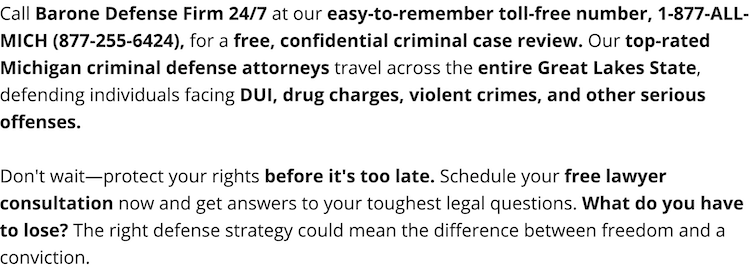Tax Evasion
Taxes are the dues we pay to live in a civilized society. Both the State of Michigan and the federal government demand this payment as a matter of law. The failure to pay taxes may be a felony level offense in Michigan and could carry heavy penalties.
However, tax evasion goes beyond the simple act of not paying a tax. The law also criminalizes the falsification of tax returns, claiming false tax credits, and even helping others do so. If a court charges you with any sort of tax evasion, you need to take steps to protect yourself. A Michigan tax evasion lawyer could help you by reviewing your case and working tirelessly to build a defense. Call today to schedule a consultation with a capable fraud attorney.
Defining Tax Evasion
Naturally, it is illegal for any person to not pay a tax to the state that is required by law. However, the concept of tax evasion is more complex than this. Michigan Compiled Law §205.27 states that it is illegal for any person to refuse or fail to make a payment or to make a false or fraudulent return. The law also criminalizes aiding or abetting another to commit tax evasion and creating any false return or making any false statement within a return
Any of these actions is a serious crime. The statute states that these offenses may be punishable by a fine of up to $5,000, a prison term of not more than five years, or both. This means that the crime may be a felony and people facing these allegations may lose voting rights, the ability to own firearms, and may be disqualified from many jobs.
Swearing to a False Return
In addition to the availability of felony-level penalties for tax evasion, the law also punishes the act of swearing to a false return. For example, if someone lists their business income as $100,000 but in reality, the business took in $200,000, this may be a false statement on a return. This may count not only as the filing of a false return but also the swearing to of a false statement. People who perform these actions may also face perjury charges.
An important concept to remember in these cases is the idea of intent. The statute states that for the state to obtain a conviction they must be able to prove the defendant intended to commit tax evasion or fraud. Because of this, one valid defense may be to argue that the alleged tax evasion was a simple mistake. Speak with a Michigan tax evasion lawyer to learn about other defense strategies that may be available.
Benefit of a Michigan Tax Evasion Attorney
Tax evasion or fraud are felony level offenses that can carry heavy fines and multiple years in prison. In addition to charges involving tax evasion, you may also be facing allegations of perjury if you allegedly made a false statement on a tax return.
A Michigan tax evasion lawyer understands Michigan's tax evasion laws and the available defenses that you may be able to raise in court. They can help you raise the argument that any false statements made in a tax return were the result of a mistake, or that you honestly believed you were not required to pay the tax in question.
 Barone Defense Firm Home
Barone Defense Firm Home
















